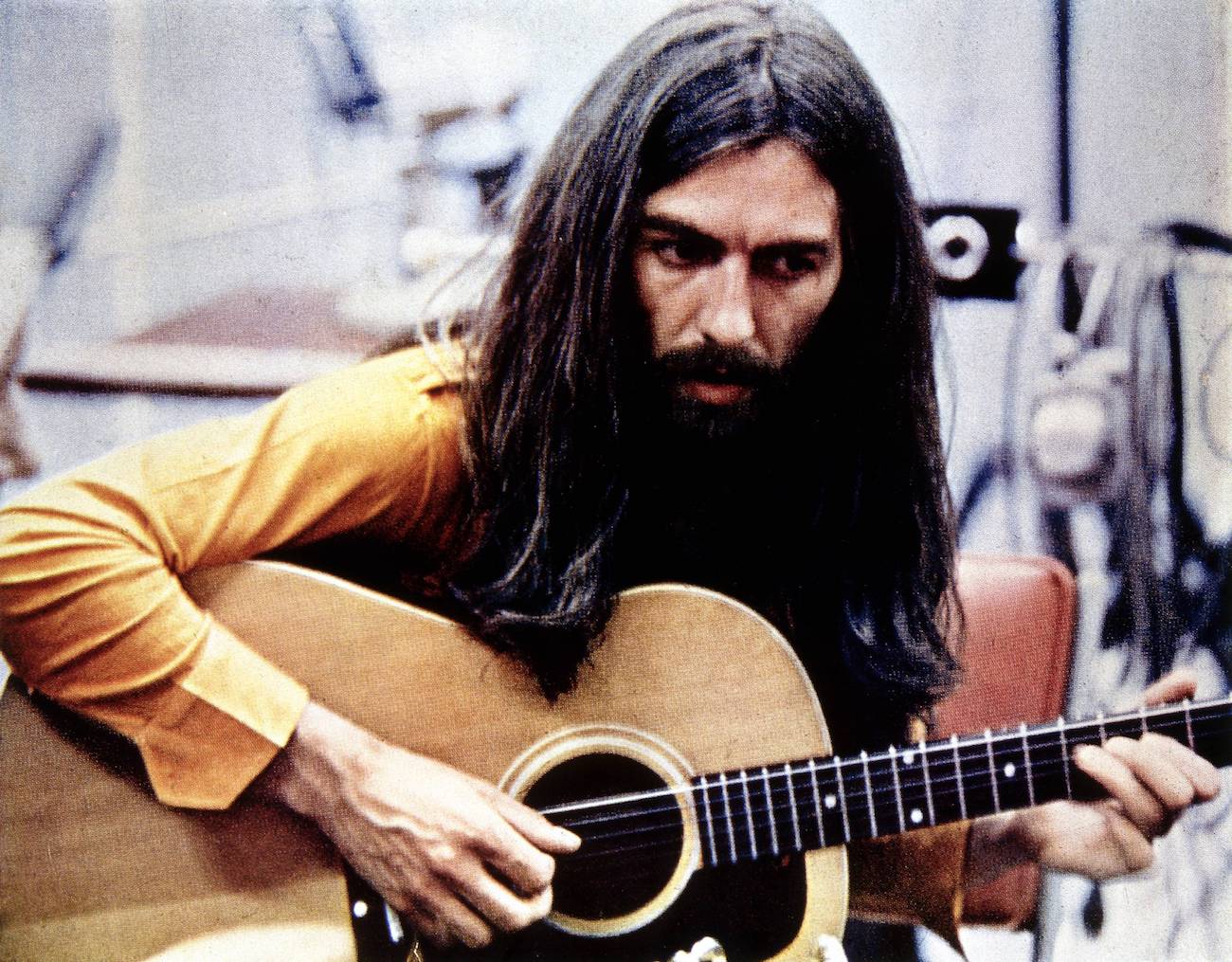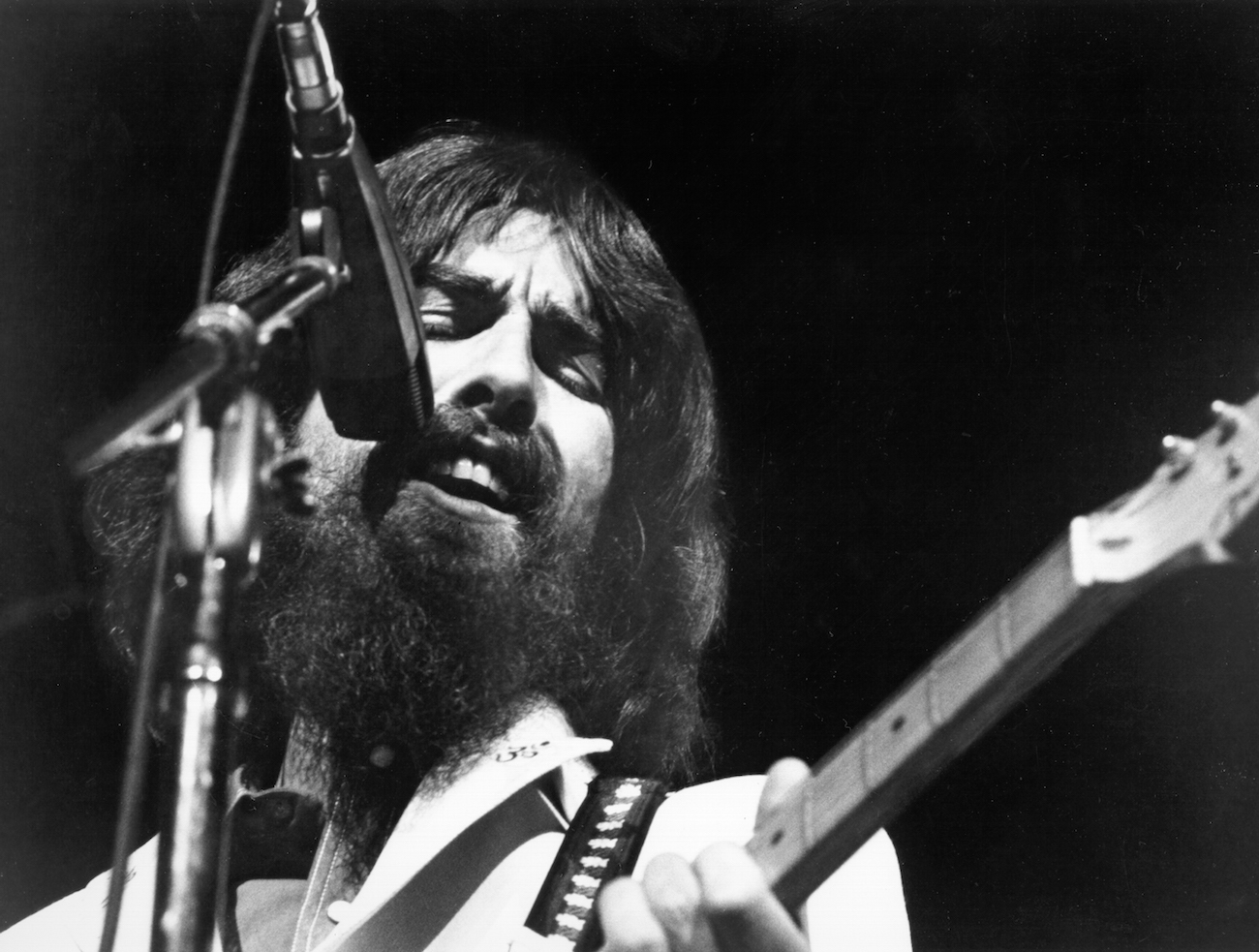
George Harrison Thanked His Gurus Who Helped Him on His Spiritual Journey in the Chorus of ‘My Sweet Lord’
George Harrison added a special thank you to the gurus who helped him on his spiritual journey in the chorus of “My Sweet Lord.” They meant a lot to him and his personal and spiritual growth.

George Harrison wanted ‘My Sweet Lord’ to be a ‘Western pop equivalent of a mantra’
Initially, George meant “My Sweet Lord” to be religious from the start. In his 1980 memoir, I Me Mine, George wrote that the Edwin Hawkins Singers’ funk and gospel version of the 18th-century hymn “Oh Happy Day” inspired him to write the song.
However, George inserted some of his own religion into the song’s lyrics. George repeats part of a Hindu mantra, “Hare Krishna… Krishna, Krishna,” and interposes it with the Christian “Hallelujah.”
In Here Comes The Sun: The Spiritual And Musical Journey Of George Harrison, Joshua M. Greene quotes George saying, “I wanted to show that ‘Hallelujah’ and ‘Hare Krishna’ are quite the same thing. I did the voices singing ‘Hallelujah’ and then the change to ‘Hare Krishna’ so that people would be chanting the maha-mantra before they knew what was going on.”
George meant “My Sweet Lord” to be “a Western pop equivalent of a mantra, which repeats over and over again the holy names.”
Greene wrote, “The lyrics declared George’s purpose in undertaking a spiritual quest. ‘I really want to see you,’ he sang. God was invisible to him but remained ‘sweet’ despite the anguish of their separation.”
George thanked his gurus in the chorus of ‘My Sweet Lord’
According to Greene, George added a special message to the gurus who’d helped him on his spiritual journey in the chorus of “My Sweet Lord.”
The author wrote, “George ended the song with a Sanskrit prayer of thanks to those teachers who had helped him find his spiritual path: gurur brahma, gurur vishnu, gurur deva maheshwara gurur sakshat, parabrahma, tasmai shri gurave namah.
“‘I offer homage to my guru,’ the prayer said, ‘who is as great as the creator Brahma, the maintainer Vishnu, the destroyer Shiva, and who is the very energy of God.’ Devotees and scholars familiar with ancient mantras were stunned to find one serving as a choral refrain in a top-ten pop tune.”
“My Sweet Lord” spoke about George’s spiritual journey and paid homage to his teachers and God. However, the former Beatle still feared its religious subject matter would offend some people. Soon, he discovered he was wrong.
The former Beatle said releasing the song was like putting his head on the chopping block
In I Me Mine, George wrote that he’d commit himself publicly by releasing “My Sweet Lord.” He anticipated that many people might “get weird about it.” He wrote, “Many people fear the words ‘Lord’ and ‘God’–makes them angry for some strange reason.”
George believed most people weren’t religious because of ignorance. They feared the unknown. “It’s some sort of instinct in people,” George explained in Martin Scorsese’s documentary, George Harrison: Living in the Material World. However, his instinct to represent something he loved, God, won the battle. Plus, no one else was talking about religion. He felt the younger generations needed to know about it.
In his memoir, George wrote that he didn’t want to hold back anymore. He wanted to show the world his love for God. “The point was, I was sticking my neck out on the chopping block because now I would have to live up to something, but at the same time I thought, ‘Nobody’s saying it; I wish somebody else was doing it,'” he said.
“At that time,” George later explained (per Greene), “nobody was committed to that type of music in the pop world. There was, I felt, a real need for that. So rather than sitting and waiting for somebody else, I decided to do it myself.
“A lot of times, we think, ‘Well, I agree with you, but I’m not going to actually stand up and be counted—too risky.’ Everybody is always trying to keep themselves covered, stay commercial. So I thought, ‘Just do it.’ Nobody else is, and I’m sick of all these young people just boogying around, wasting their lives, you know.”
Later, one critic wrote that the song was “among the boldest steps in the history of popular music” yet with the potential to be “a fatal career move.” Greene continued, “The boldness was the naked emotion of George’s surrender to God. The gamble was whether fans would still accept him after realizing the depth of his devotion.”
George’s gamble paid off. Fans continued to thank him for the song for years. The gurus loved it too. However, most importantly, “My Sweet Lord” soothed George’s soul and brought him closer to God.


